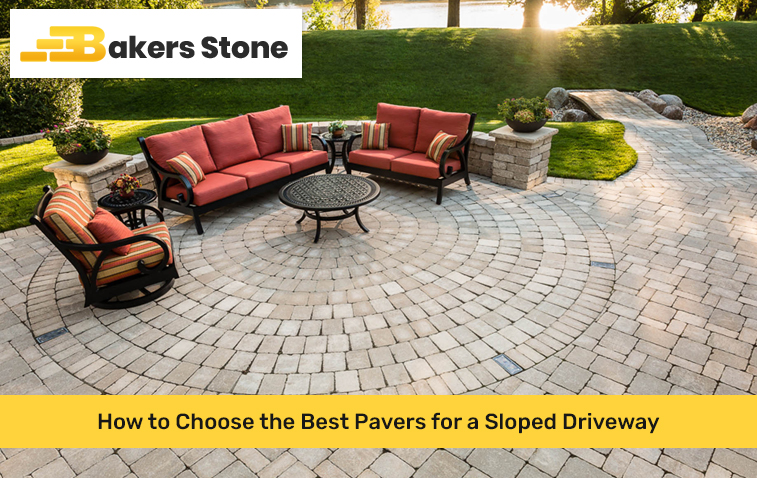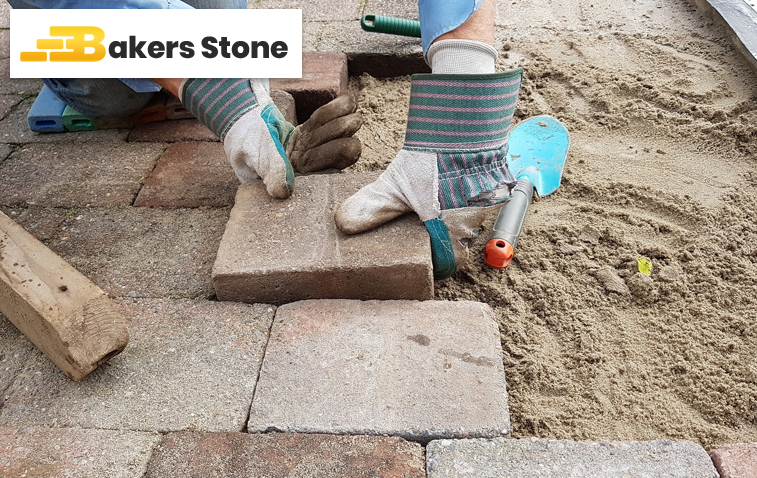How to Choose the Best Pavers for a Sloped Driveway
Imagine your driveway as a slide, where everything wants to roll down when it’s sloped. This makes selecting pavers for sloped driveways more challenging. The right pavers need to stay in place, be safe for walking and driving, and enhance the look of your driveway. Choosing the best pavers for a sloped driveway involves considering their slip-resistance, durability, and how well they fit together. You also want to select pavers that complement your home’s appearance.

Understanding Sloped Driveways
What Makes a Sloped Driveway Different?
A sloped driveway is like a mini hill. It’s not flat like most driveways. This means:
- Water runs down it faster.
- Cars might roll if not parked carefully.
- It can be harder to walk on, especially when wet.
- Snow and ice can be more dangerous on it.
These things make choosing the right pavers extra important.
Challenges of Sloped Driveways
Sloped driveways have some special problems:
- Pavers might try to slide downhill over time.
- Water can wash away the sand between pavers.
- It’s harder to make things level when installing pavers.
- The bottom of the slope might get more wear and tear.
Good pavers and proper installation can help solve these problems.
Types of Pavers for Sloped Driveways
Interlocking Concrete Pavers
These pavers are like Lego blocks for your driveway. They fit together snugly. This is good because:
- They don’t slide around easily.
- They come in many shapes and colors.
- They’re strong and can handle heavy cars.
- Water can drain between them if installed right.
Interlocking pavers are a popular choice for sloped driveways.
Permeable Pavers
Permeable pavers are special. They let water go through them. This is helpful because:
- They reduce puddles and runoff.
- They can help prevent ice in winter.
- They’re good for the environment.
- They come in different styles and colors.
These pavers are great for areas that get a lot of rain.
Brick Pavers
Brick pavers are classic. They’ve been used for a long time. People like them because:
- They look nice and traditional.
- They’re very strong and last a long time.
- They don’t fade much in the sun.
- They can be laid in pretty patterns.
Brick pavers can make your driveway look elegant.
Natural Stone Pavers
Natural stone pavers are made from real rocks. They’re unique because:
- Each stone looks a bit different.
- They’re very strong and durable.
- They can look rustic or fancy.
- They often have rough surfaces, which can be good on slopes.
Natural stone can make your driveway look really special.
Important Features for Sloped Driveway Pavers
Non-Slip Surface
On a slope, you don’t want slippery pavers. Look for:
- Pavers with rough or textured surfaces.
- Materials that aren’t too smooth when wet.
- Pavers designed for outdoor use.
Non-slip pavers help keep people and cars safe.
Interlocking Design
Pavers that lock together are great for slopes. They:
- Stay in place better.
- Don’t shift as much over time.
- Can handle the weight of cars better.
- Often look nice because of their patterns.
Interlocking designs help your driveway last longer.
Durability
Sloped driveways need tough pavers. Good pavers should:
- Not crack easily.
- Handle freeze and thaw cycles well.
- Resist stains from car oil and other spills.
- Keep their color for many years.
Durable pavers save you trouble in the long run.
Water Drainage
Water can cause problems on sloped driveways. Good pavers will:
- Let water drain between them.
- Not get slippery when wet.
- Help prevent puddles at the bottom of the slope.
- Work well with drainage systems.
Proper drainage keeps your driveway safe and long-lasting.
Choosing the Right Paver Shape
Rectangle Pavers
Rectangle pavers are a common choice. They’re good because:
- They’re easy to lay in different patterns.
- They can make your driveway look wider or longer.
- They often interlock well on the sides.
- They come in many sizes.
Rectangle pavers are versatile and classic.
Hexagon Pavers
Hexagon pavers have six sides. They’re interesting because:
- They fit together like a puzzle.
- They can make cool patterns.
- They’re good at spreading out weight.
- They often stay in place well on slopes.
Hexagon pavers can give your driveway a unique look.
Cobblestone-Style Pavers
These pavers look like old-fashioned street stones. People like them because:
- They have a charming, old-world look.
- They often have uneven surfaces, which can be good on slopes.
- They come in different sizes for interesting patterns.
- They’re usually very strong.
Cobblestone-style pavers add character to your driveway.
Color and Style Considerations
Complementing Your Home
Your driveway pavers should look good with your house. Think about:
- Choosing colors that match or complement your house color.
- Picking a style that fits your house’s architecture.
- Using pavers to make your house look even better.
- Thinking about how the pavers will look in different lights.
The right pavers can make your whole property look great.
Light vs. Dark Colors
The color of your pavers matters on a slope. Here’s why:
- Light colors can make your driveway look bigger.
- Dark colors can hide stains better.
- Light colors might show tire marks more.
- Dark colors can get hotter in the sun.
Choose a color that works for your climate and preferences.
Mixing Colors and Patterns
You can get creative with paver colors and patterns. You could:
- Use two colors to make a border.
- Create a pattern that guides the eye up the slope.
- Mix light and dark pavers to hide dirt.
- Use different colored pavers to mark parking spots.
Mixing colors and patterns can make your driveway unique.

Installation Considerations for Sloped Driveways
Proper Base Preparation
A good base is super important for sloped driveways. It helps:
- Keep pavers from sliding downhill.
- Make sure water drains properly.
- Prevent pavers from sinking unevenly.
- Make your driveway last longer.
Take time to prepare a solid, well-draining base.
Edging and Restraints
Edges are very important on sloped driveways. They:
- Keep pavers from spreading apart.
- Help hold everything in place.
- Can look nice and finish the driveway neatly.
- Might be visible, so choose ones that look good.
Strong edging is a must for sloped paver driveways.
Drainage Solutions
Good drainage keeps your driveway safe and lasting. Consider:
- Installing drain channels at the bottom of the slope.
- Using permeable pavers to let water through.
- Making sure water has somewhere to go.
- Sloping the driveway slightly to the sides for water runoff.
Proper drainage prevents many problems in the future.
Maintenance Tips for Paver Driveways on Slopes
Regular Cleaning
Keeping your driveway clean is important. Here’s what to do:
- Sweep it regularly to remove dirt and leaves.
- Wash it with a hose or pressure washer sometimes.
- Clean up spills quickly to prevent stains.
- Remove any weeds that grow between pavers.
Clean pavers look better and last longer.
Resealing
Sealing your pavers helps protect them. Remember to:
- Reseal every few years.
- Choose a sealer that’s right for your type of pavers.
- Apply sealer on a dry, clean surface.
- Follow the instructions carefully.
Sealing helps your pavers stay strong and good-looking.
Replacing Damaged Pavers
Sometimes pavers can get damaged. When this happens:
- Remove the damaged paver carefully.
- Clean the area underneath.
- Put in a new paver that matches.
- Make sure it’s level with the others.
Fixing damaged pavers quickly keeps your driveway safe and nice.
Choosing pavers for a sloped driveway might seem tricky, but it can be fun too! Remember to pick pavers that are strong, non-slippery, and look good with your house. Think about how water will drain and how the pavers will stay in place on the slope. Interlocking pavers, permeable ones, bricks, and natural stones are all good options.
The shape and color of your pavers can make your driveway look really cool. Don’t forget about proper installation and maintenance to keep your driveway looking great for years. With the right pavers, your sloped driveway can be both beautiful and practical. So go ahead and create a driveway that makes you smile every time you come home!
FAQs
A good rule of thumb is a 1-2% slope away from your house. This means for every 10 feet of length, your driveway should drop 1-2 inches. Use a long level or string level to measure. Always check local building codes for specific requirements.
Yes, you can mix paver materials creatively. For example, use brick pavers for the main area and natural stone for borders. Ensure all materials have similar thickness for smooth transitions. This can create unique designs while maintaining functionality on the slope.
Low-growing, drought-resistant plants like creeping thyme or sedum work well. Consider retaining walls with built-in planters for steeper slopes. These elements can enhance drainage, prevent erosion, and add visual appeal to your sloped driveway.
Seasonal changes can impact pavers differently. Freeze-thaw cycles in winter can cause shifting. Summer heat can expand materials. Choose pavers rated for your climate. Regular maintenance, like resealing before winter, helps pavers withstand seasonal stresses on slopes.
